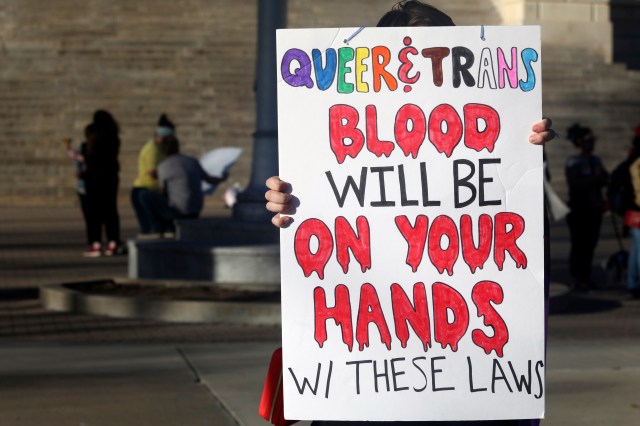
Sources familiar with D.C.’s LGBTQ nightlife scene say widespread reports on social media of the sudden and unexpected deaths of two widely known and beloved gay men from an apparent accidental drug overdose on Dec. 27 at one of the men’s homes has triggered an outcry for the city and the community to become more aggressive in addressing the opioid overdose problem and how it is impacting the LGBTQ community.
D.C. police and Fire and Emergency Medical Services Department reports show that prominent D.C. attorney and LGBTQ rights supporter Brandon Roman, 38, and historic preservation expert and home renovation business owner Robert ‘Robbie’ Barletta, 28, were found unconscious when police and emergency medical personnel arrived at Barletta’s house on the afternoon of Dec. 27.
The reports show that Roman was declared deceased at the scene shortly after D.C. police and an ambulance arrived at the house in response to a 911 call. According to one of the reports, Barletta was taken to Washington Hospital Center where he died on Dec. 29.
Both men were regular patrons at popular D.C. gay bars, including the gay nightclub and dance bar Bunker and the recently opened gay bar and lounge Shakers.
“Come to Honor their Lives in Your Best Sparkles and Shimmers – Saturday, February 3rd 5-8pm at Shakers,” according to an announcement by Shakers posted on Instagram of a celebration of life for Roman and Barletta.
Johnny Bailey, community outreach coordinator for the LGBTQ supportive community services organization HIPS, said the widespread news of Roman and Barletta’s passing has prompted more interest and support for the overdose training sessions that HIPS and other groups have been organizing at D.C. nightlife venues, including bars and nightclubs.
Bailey noted that one of the training sessions is scheduled for Saturday, Jan. 27 at the D.C. gay bar Trade. He said the next one was scheduled for Monday, Jan. 29 at the Adams Morgan gay bar Pitchers. Among other things, facilitators at the trainings will be distributing the life-saving overdose antidote Narcan and testing kits for fentanyl, which experts say is the leading cause of drug overdose deaths when it appears in other drugs such as cocaine without the knowledge of users of those other drugs.
According to Bailey, the gay bar JR.’s on 17th Street near Dupont Circle has hosted a table set up by HIPS to distribute Narcan, fentanyl test strips, and condoms on nights when the bar holds its popular drag shows.
Bailey said he did not know Roman and Barletta personally but people he works with at HIPS knew them and, according to his sources in the community, people who knew the two men believe their apparent overdose was caused by taking some other drug contaminated with fentanyl.
“It’s horrible when it takes a tragedy for things to come together,” Bailey told the Washington Blade. “But this tragedy has truly triggered a powerful response. It was a real wakeup call to a lot of people,” he said. “So, this happening to them really triggered something.”
Among other things, Bailey said, it has heightened interest in the training sessions at bars and other nightlife venues and prompted HIPS and other organizations to increase the number of the trainings.
David Perruzza, owner of Pitchers, said he was happy to host the training session at his bar on Jan. 29. He said he was among the business owners and community members to urge D.C. Mayor Muriel Bowser’s Office of LGBTQ Affairs to become involved in boosting overdose prevention efforts “because I was sick of people dying.”
Bailey and Jennifer Loken, interim director of Therapy and Substance Use Treatment at D.C.’s Whitman-Walker Health, each said it was difficult to determine exactly how many LGBTQ people in the city have survived or died from a drug overdose because the city doesn’t specifically count or keep track of overdose cases based on a person’s sexual orientation or gender identity.
The D.C. Office of the Chief Medical Examiner, which investigates and gathers data on D.C. drug overdose cases, breaks down its demographic data by race-ethnicity, gender, age, and jurisdiction of residence by city ward. In its most recent report, the medical examiner’s office says it has investigated 2,134 deaths due to the use of opioids from Jan. 1, 2017, through Feb. 28, 2023. In those years, the number of overdose deaths increased each year except for 2018, when there was a small decrease, followed by an increase in 2019 with a sharp increase in 2022 and 2023.
In 2022, the most recent year in which the full year data was tabulated, the report says there were 458 overdose deaths, with an average of 38 deaths per month.
“Overall, 1,807 or 84 percent of all deaths due to opioid use were among Blacks” from January 2017 through May 2023, the report says. “Approximately 72 percent of all fatal opioid overdoses occur among adults between the ages of 40-69 years old,” with 30 percent of those deaths due to opioid use among people ages 50 to 59, the report states. And the report shows that fatal opioid overdoses are far more common among males than females. In 2023, 76 percent of the overdose deaths were among men and 24 percent among women, the report shows.
Asked if Whitman-Walker has a sense or estimate of whether LGBTQ overdose cases are increasing like they are in the overall D.C. population, Loken said, “I would say yes from what I hear anecdotally. Any overdose death is a significant loss.” She added, “So, I think in general, yes, the risk is increasing. Exactly to what degree I don’t know.”
Rodney Adams, general counsel and spokesperson for the Office of the Chief Medical Examiner, said it would be difficult for the office to attempt to keep track of overdose deaths based on a person’s sexual orientation or gender identity for transgender people. Among other things, the sexual orientation or gender identity of a deceased person taken to the medical examiner’s facility for an autopsy and toxicology tests to determine the cause and manner of death would be difficult to determine, Adams said.
“I don’t think we can go out and question the next of kin of what they think their loved one identified as,” Adams told the Blade. “We have a difficult enough conversation with families when we tell them that their loved one is deceased.”
Loken of Whitman-Walker said Whitman-Walker has several programs and services for those who use drugs, including providing medication to help people who may want to stop using an opioid drug as well as harm reduction programs to help someone who wishes to continue using a drug to do so in the safest possible way.
“Sometimes there’s a lot of stigma around substance use in general,” Loken said. “And we definitely don’t want anyone to feel shameful or that they can’t ask for what they need.” All of Whitman-Walker’s substance use treatment or support programs are nonjudgmental toward those who are substance users, Loken told the Blade.
Bailey said one potential problem HIPS has encountered in organizing overdose training sessions at bars and other nightlife businesses is some of the businesses declined to host a training session because they were concerned the city’s Alcoholic Beverage and Cannabis Administration (ABCA), which regulates the sale of alcoholic beverages in the city, might penalize them for appearing to encourage drug use. Bailey said owners at some bars said they were afraid ABCA might take steps to revoke their liquor license if they hosted an overdose training session in which Narcan and drug testing kits were distributed
Jarred Powell, ABCA’s chief of staff, in response to an inquiry from the Blade, said ABCA would not penalize businesses for hosting such a training.
“ABCA is strongly supportive of alcohol licensed businesses encouraging their staff to become trained in opioid overdose prevention and naloxone administration and for businesses to have naloxone on hand to administer if any opioid overdose occurs,” Powell said in a statement to the Blade. Naloxone is the generic name for the overdose treatment medication Narcan.
“Additionally, ABCA supports businesses posting and distributing overdose prevention and treatment resources such as posters and brochures,” Powell said. “All are critically important components to D.C.’s harm reduction approach to substance abuse.”
Powell said ABCA is also collaborating with the D.C. Department of Behavioral Health, which oversees the city’s overdose prevention programs, and the Mayor’s Office of Nightlife and Culture and Office of LGBTQ Affairs to increase the city’s overdose prevention initiatives and to co-host Narcan administration trainings.
Japer Bowles, director of the Mayor’s Office of LGBTQ Affairs, issued an announcement on Dec. 31 praising HIPS, the city’s Department of Behavioral Health, and the LGBTQ supportive Capital Ballroom Council for making sure “every LGBTQIA nightlife establishment in D.C.” had Narcan in time for their New Year’s Eve celebrations.
Bailey, meanwhile, said he and other HIPS staff members will continue the work they started in the recent past to organize overdose prevention trainings.
“We go anywhere in the community,” he said. “I’ve done libraries, bars. I did a church one day and the Sisters of Perpetual Indulgence the next day,” he said, referring to the group that performs in drag dressed as nuns. “Any and all sorts of places we do these Narcan trainings.”



